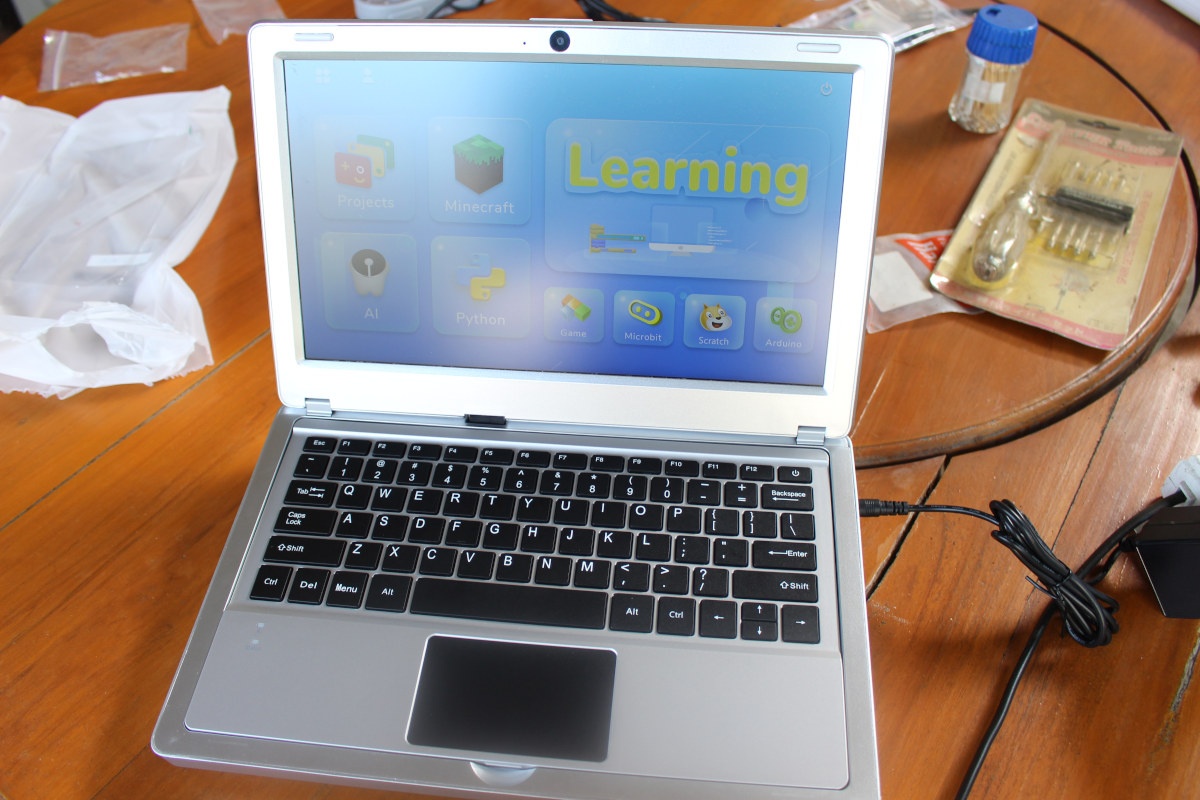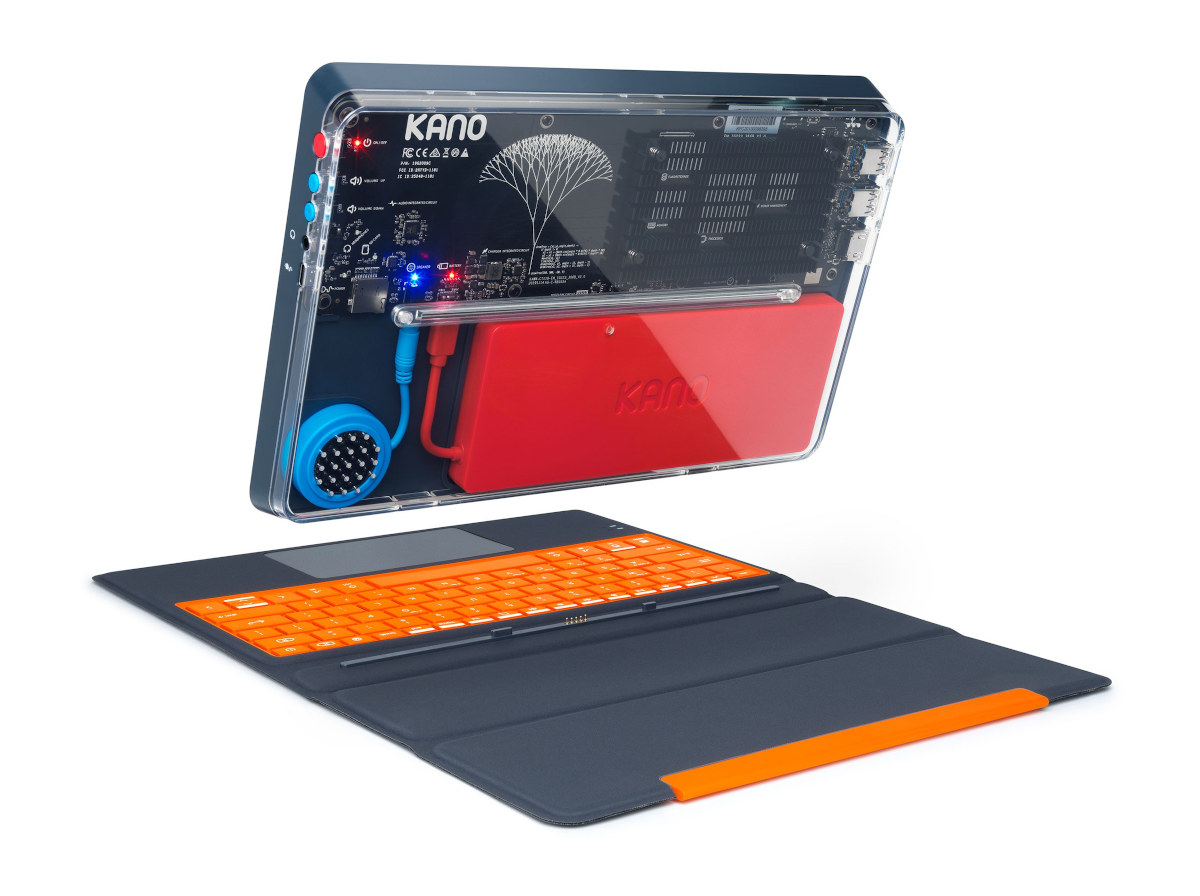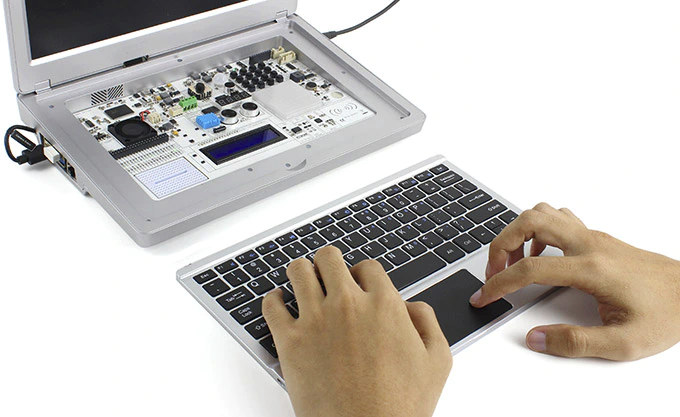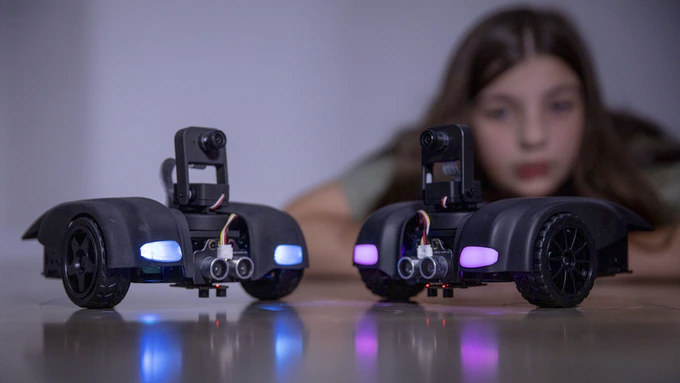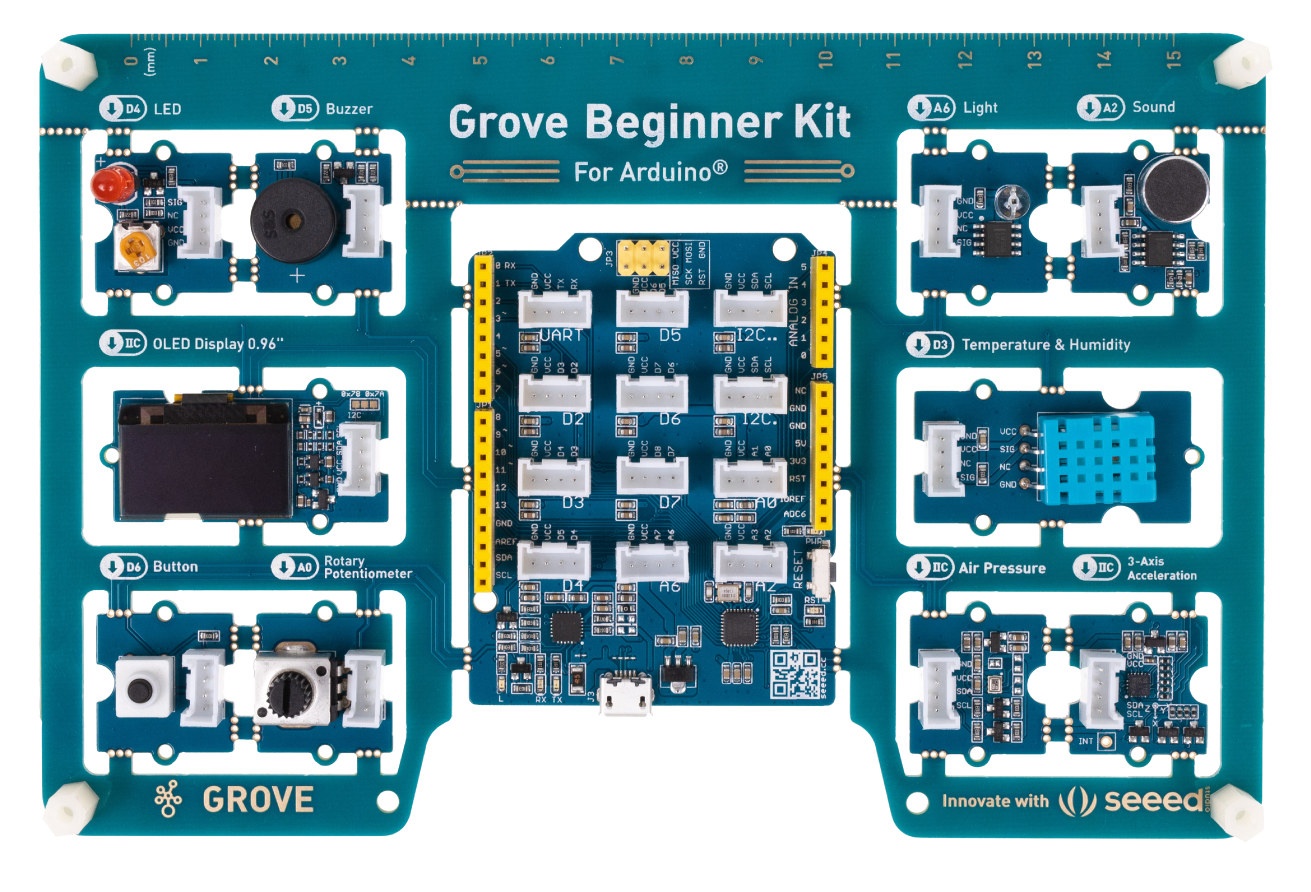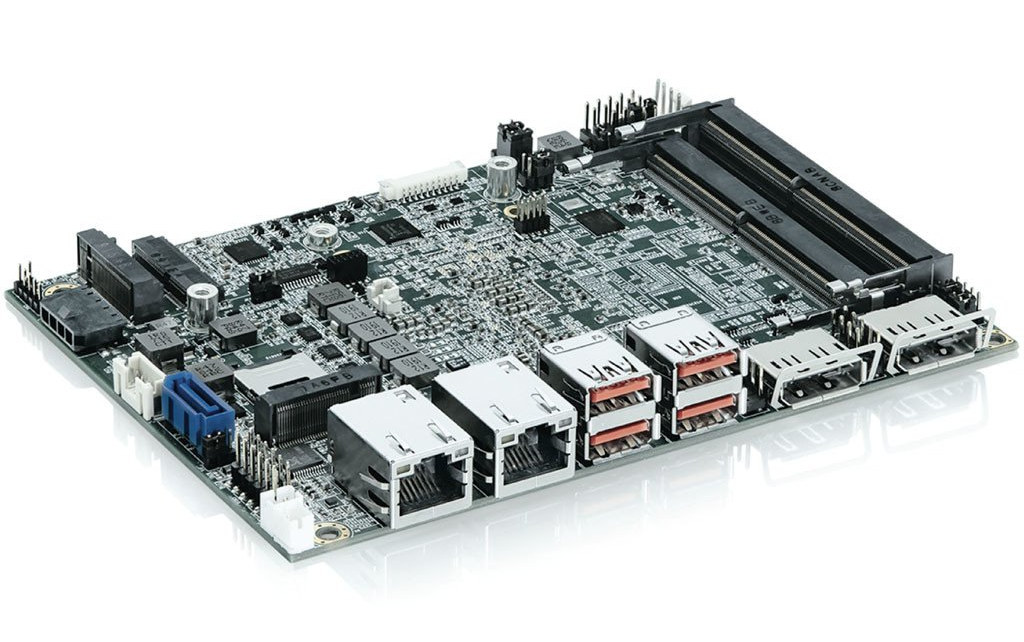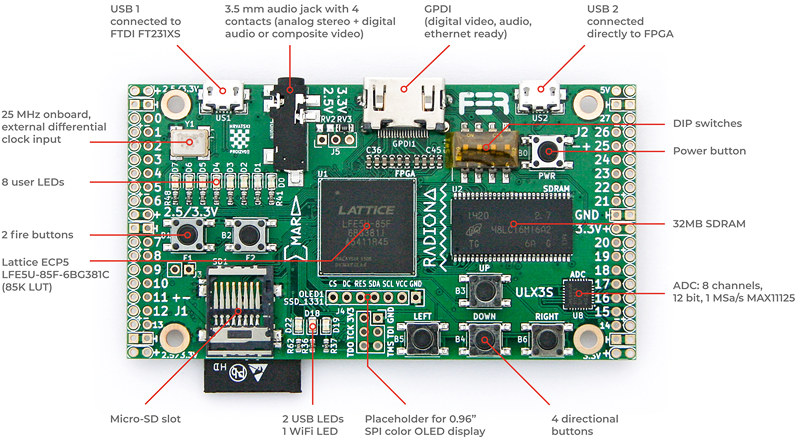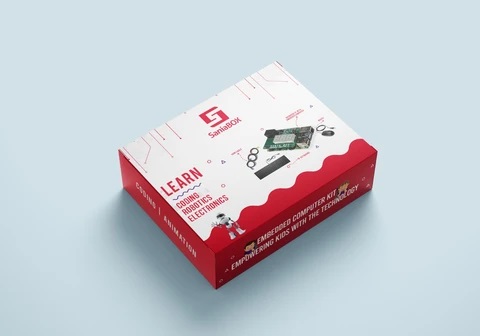Last month, we wrote about Elecrow introducing CrowPi2 Raspberry Pi 4 laptop and electronics learning kit for its launch on Kickstarter crowdfunding website. The company has now sent one of its kits to CNX Software for evaluation and review. I’ll start by checking out the content of the package, and boot it up, before publishing a more detailed review in a few weeks. The package is fairly big and highlights it’s made for kids over 8 years old with close to 100 course resources and over 20 electronics modules. The back of the package list the main features and package contents with for example a 11.6″ Full HD display, Raspberry Pi 4 4GB board running a customized (Linux) system or Retropie for game emulation, electronics components and modules like servos and motors, as well as some resources for gaming including two USB gamepads. The first things we get when opening […]
Kano PC 2-in-1 DIY Hybrid Laptop is Powered by an Intel Celeron N4000 Gemini Lake SoC
Kano PC DIY computer kit was launched last year with a low-end Intel Atom x5-Z8350 processor and designed to help kids learn about computers. The company has now launched the second-generation Kano PC with a faster Intel Celeron N4000 dual-core processor, and longer battery life making the 2-in-1 DIY Hybrid laptop/tablet capable of rivaling with entry-level laptops and Chromebooks. Kano PC specifications: SoC – Intel Celeron N4000 dual-core Gemini Lake processor @ 1.10 GHz with Intel UHD graphics; 6W TDP System Memory – 4GB DDR3L RAM Storage – 64GB eMMC flash with 164 MB/s write speed, MicroSD slot Display – 11.6″ touchscreen with 1366 x 768 resolution Video Output – 1x HDMI port Audio – 3.5mm headphone jack, 3.5mm speaker level jack, 1x microphone Connectivity – Dual-band Wi-Fi 4 802.11 b/g/n, Bluetooth 5.0 USB – 2x USB 3.0, 1x USB-C LEDs – 1x power on (red), 1x barrel connector (red), […]
CrowPi2 Raspberry Pi 4 Laptop Doubles as Electronics Learning Kit (Crowdfunding)
CrowPi portable learning kit for Raspberry Pi 3 B+ and Pi Zero boards was launched in 2018. It comes with a 7″ display, several sensors, buttons, a breadboard, and more all packed in a small suitcase. Elecrow has now started a new crowdfunding campaign on Kickstarter to fund the second generation portable electronics learning kit: CrowPi2 which looks much more like a laptop than a suitcase found in the first model thanks to a large display, and a detachable keyboard placed on top of the electronic prototyping/learning area. It’s also more powerful thanks to the latest Raspberry Pi 4 SBC. CrowPi2 specifications: Compatible Raspberry Pi boards – Raspberry Pi 3B/B+, Raspberry Pi 4 Display – 11.6-inch 1920×1080 IPS screen Camera – 2MP camera Audio – Built-in microphone and stereo speaker; 3.5mm audio jack Keyboard – 2.4GHz detachable wireless keyboard (QWERTY only) with touchpad Sensors and Modules under the keyboard: Displays […]
MARK AI Robot Kit Aims to Teach AI & Robotics to 12+ Years Old (Crowdfunding)
We’ve written about Kendryte K210 RISC-V AI processor, and Sipeed M1 module several times including in our getting started for Maixduino and GroveAI HAT boards for low-power AI inference such as object recognition or face detection using Arduino and Micropython programming. Shenzhen-based Tinkergen, a STEM Education owned by Seeed Studio, has now leveraged the low-cost processor to design MARK AI robot kit, where MARK stands for Make A Robot Kit, in order to processor an educational AI Robotics platform for children ages 12 years old and more. MARK will ship as a kit with the main parts and components including a chassis, a cover, two wheels, stepper motors, a pan-tilt camera with K210 processor, a 2.4″ LCD display, Grove & Arduino compatible MARKduino interface board, some sensors, and six AA batteries. Tinkergen offers pre-trained model to recognized objects like humans, books, pens, or smartphones, as well as traffic signs, numbers […]
Grove Beginner Kit for Arduino Features Arduino UNO Compatible Board & Ten Pre-wired Modules
Arduino boards are great to get started with electronics has they offer an ecosystem of expansion modules and libraries, as well as tutorials, that may it easy to get started with almost any projects. Seeed Studio Grove is a family of standardized modules with 4-pin headers using digital I/O, analog I/O, UART or I2C interfaces and allowing you to easily connect to compatible board such as Seeeduino Lotus board. You still need to connect the Grove module via cables, so Seeed Studio decided to create a big board called Grove Beginner Kit for Arduino that features Seeduino Lotus at the center and ten pre-wired and detachable Grove modules so no cabling is required to get started apart from a USB cable. List of Grove Beginner Kit for Arduino board and modules: Seeeduino Lotus ATmega320p board compatible with Arduino UNO compatible board and featuring 12 Grove connectors 10 pre-wired modules without […]
Kontron 3.5″-SBC-WLU Single Board Computer Takes CNVi M.2 WiFi Cards
We first found out about Intel CNVi (Connectivity Integration Architecture) for WiFi in a block diagram for Gemini Lake processors in 2017. CNVi integrates a WiFi MAC, Bluetooth MAC, and Baseband Modem into the processor, and connect over a CNVio interface to a separate CRF (Companion RF) module handling the RF part. This allows overall cost & power savings and reduction in size. AFAIK, all new Intel desktop and mobile processors come with a CNVi block, but somehow only a few SBC’s are made with M.2 slot compliant with CNVi WiFi cards. But Kontron 3.5″-SBC-WLU single board computer powered by an Intel Whiskey Lake processor is one of those and features an M.2 E-key slot that supports Intel Integrated Connectivity (CNVi) WiFi & Bluetooth modules. Kontron 3.5″-SBC-WLU specifications: SoC (one or the other) Intel Core i7-8665UE quad-core processor @ up to 4.4 GHz with 8MB cache, Intel UHD Graphics 620; […]
Radiona ULX3S Open Source Hardware ECP5 FPGA Development Board Launched for $99 and Up (Crowdfunding)
Last summer, we wrote about Radiona ULX3S education board combining a Lattice Semi ECP5 FPGA with an Espressif Systems ESP32 WiFi & Bluetooth WiSoC. Designed for a digital logic course at the University of Zagreb, the board is open-source hardware with KiCAD hardware design files released on GitHub, and programmable with the Arduino IDE (FPGArduino) and ProjectTrellis open-source toolchain. At the time, there was only a version based on Lattice ECP5 85F with 84K LUT, but they’ve now made versions with cheaper variants of ECP5 FPGA and launched the board on Crowd Supply. Radiona ULX3S specifications: FPGA (one of the other) Lattice ECP5 LFE5U-85F-6BG381C with 84K LUT Lattice ECP5 LFE5U-45F-6BG381C with 44K LUT Lattice ECP5 LFE5U-12F-6BG381C with 12K LUT System Memory – 32MB SDRAM @ 166 MHz Storage – 4–16MB Quad-SPI Flash for FPGA config and user data storage; MicroSD slot Audio – 3.5 mm jack with 4 contacts (analog […]
Sania Box Raspberry Pi 4 based DIY Kit is Designed for STEM Education (Crowdfunding)
Sania Box, A Special Kind of DIY RPi4 Based Kit The 13-year-old Sania Jain is a young entrepreneur, published writer and tech aficionado who now offers an embedded computer kit called Sania Box. The Raspberry Pi 4 based embedded system kit comes with an add-on board and has been designed to develop coding skills in anyone 8 years old or more, and for learning IoT, STEM, and for all kinds of DIY fun. Background Some DIY RPi-based kits can be found in our archives, such as the Piper Computer Kit 2 made for children’s education, but there’s now another option thanks to Sania Jain who has been designing, building, and writing in the STEM arena for some time. Sania Jain’s accomplishments are amazing, and look to be just her beginning in STEM-based endeavors. A Concept With Wide Reach The Sania Box was conceived by Sania Jain and built by Moonshot […]


